Emotional Intelligence: Measurement, Benefits & Improvement Essay
VerifiedAdded on 2023/03/23
|7
|1399
|28
Essay
AI Summary
This essay provides a detailed analysis of emotional intelligence, defining it as the ability to manage one's own and others' emotions, a crucial skill for leadership. It explores various methods for measuring emotional intelligence, including the BarOn EQ-i, Seligman Attributional Style Questionnaire, Multifactor Emotional Intelligence Scale (MEIS), and Emotional Competence Inventory. The essay highlights the advantages of emotional intelligence, such as increased motivation, fostering a common vision, adapting to change, and improving communication. It also discusses strategies for improving emotional intelligence, including reducing negative emotions, being mindful of vocabulary, practicing empathy, and recovering from adversity. The essay concludes that emotional intelligence can be developed through conscious effort and practice.

EMOTIONAL INTELLIGENCE 1
Student Name –
Student Number –
Teachers Name –
Title – Emotional Intelligence
Student Name –
Student Number –
Teachers Name –
Title – Emotional Intelligence
Paraphrase This Document
Need a fresh take? Get an instant paraphrase of this document with our AI Paraphraser
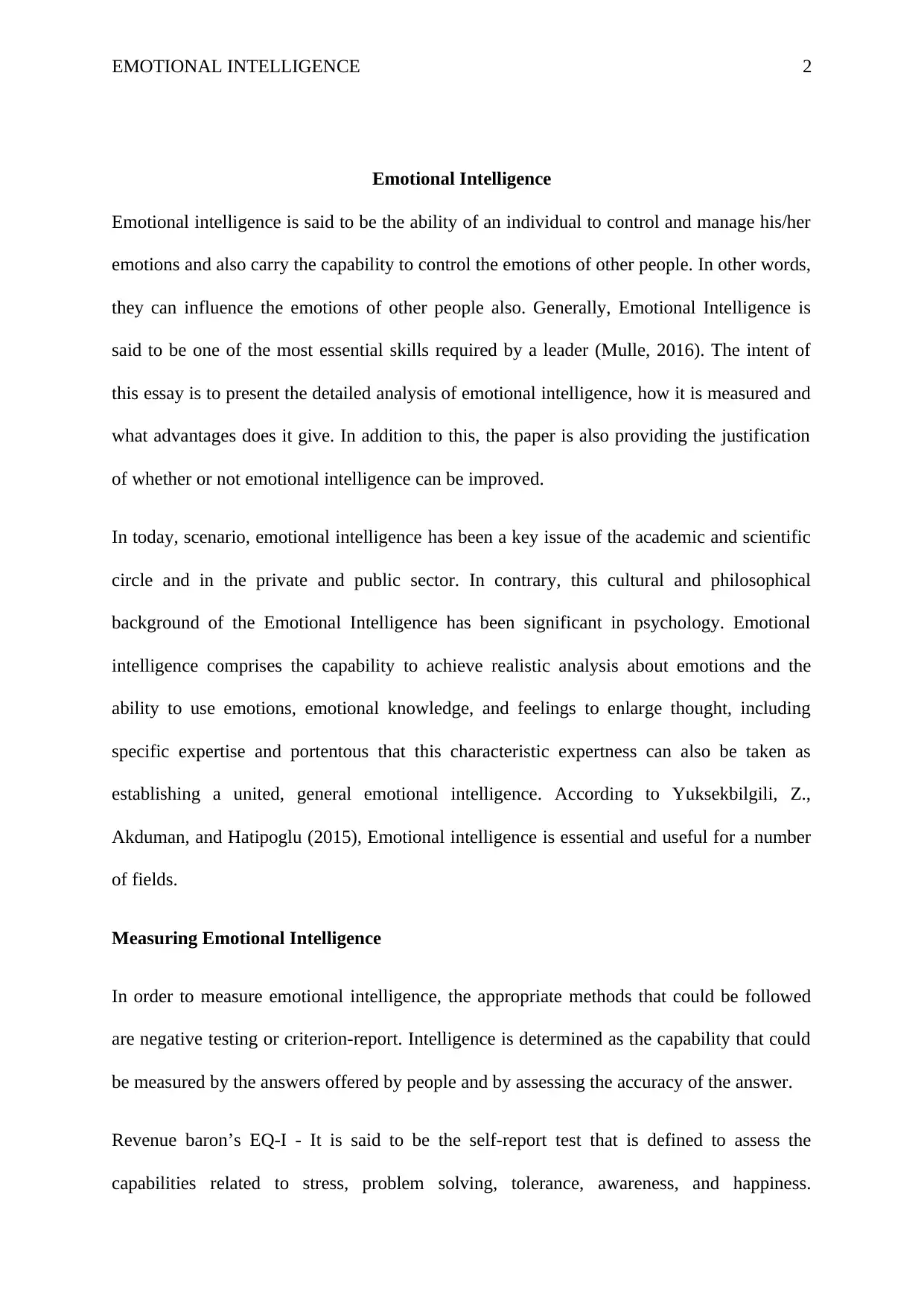
EMOTIONAL INTELLIGENCE 2
Emotional Intelligence
Emotional intelligence is said to be the ability of an individual to control and manage his/her
emotions and also carry the capability to control the emotions of other people. In other words,
they can influence the emotions of other people also. Generally, Emotional Intelligence is
said to be one of the most essential skills required by a leader (Mulle, 2016). The intent of
this essay is to present the detailed analysis of emotional intelligence, how it is measured and
what advantages does it give. In addition to this, the paper is also providing the justification
of whether or not emotional intelligence can be improved.
In today, scenario, emotional intelligence has been a key issue of the academic and scientific
circle and in the private and public sector. In contrary, this cultural and philosophical
background of the Emotional Intelligence has been significant in psychology. Emotional
intelligence comprises the capability to achieve realistic analysis about emotions and the
ability to use emotions, emotional knowledge, and feelings to enlarge thought, including
specific expertise and portentous that this characteristic expertness can also be taken as
establishing a united, general emotional intelligence. According to Yuksekbilgili, Z.,
Akduman, and Hatipoglu (2015), Emotional intelligence is essential and useful for a number
of fields.
Measuring Emotional Intelligence
In order to measure emotional intelligence, the appropriate methods that could be followed
are negative testing or criterion-report. Intelligence is determined as the capability that could
be measured by the answers offered by people and by assessing the accuracy of the answer.
Revenue baron’s EQ-I - It is said to be the self-report test that is defined to assess the
capabilities related to stress, problem solving, tolerance, awareness, and happiness.
Emotional Intelligence
Emotional intelligence is said to be the ability of an individual to control and manage his/her
emotions and also carry the capability to control the emotions of other people. In other words,
they can influence the emotions of other people also. Generally, Emotional Intelligence is
said to be one of the most essential skills required by a leader (Mulle, 2016). The intent of
this essay is to present the detailed analysis of emotional intelligence, how it is measured and
what advantages does it give. In addition to this, the paper is also providing the justification
of whether or not emotional intelligence can be improved.
In today, scenario, emotional intelligence has been a key issue of the academic and scientific
circle and in the private and public sector. In contrary, this cultural and philosophical
background of the Emotional Intelligence has been significant in psychology. Emotional
intelligence comprises the capability to achieve realistic analysis about emotions and the
ability to use emotions, emotional knowledge, and feelings to enlarge thought, including
specific expertise and portentous that this characteristic expertness can also be taken as
establishing a united, general emotional intelligence. According to Yuksekbilgili, Z.,
Akduman, and Hatipoglu (2015), Emotional intelligence is essential and useful for a number
of fields.
Measuring Emotional Intelligence
In order to measure emotional intelligence, the appropriate methods that could be followed
are negative testing or criterion-report. Intelligence is determined as the capability that could
be measured by the answers offered by people and by assessing the accuracy of the answer.
Revenue baron’s EQ-I - It is said to be the self-report test that is defined to assess the
capabilities related to stress, problem solving, tolerance, awareness, and happiness.
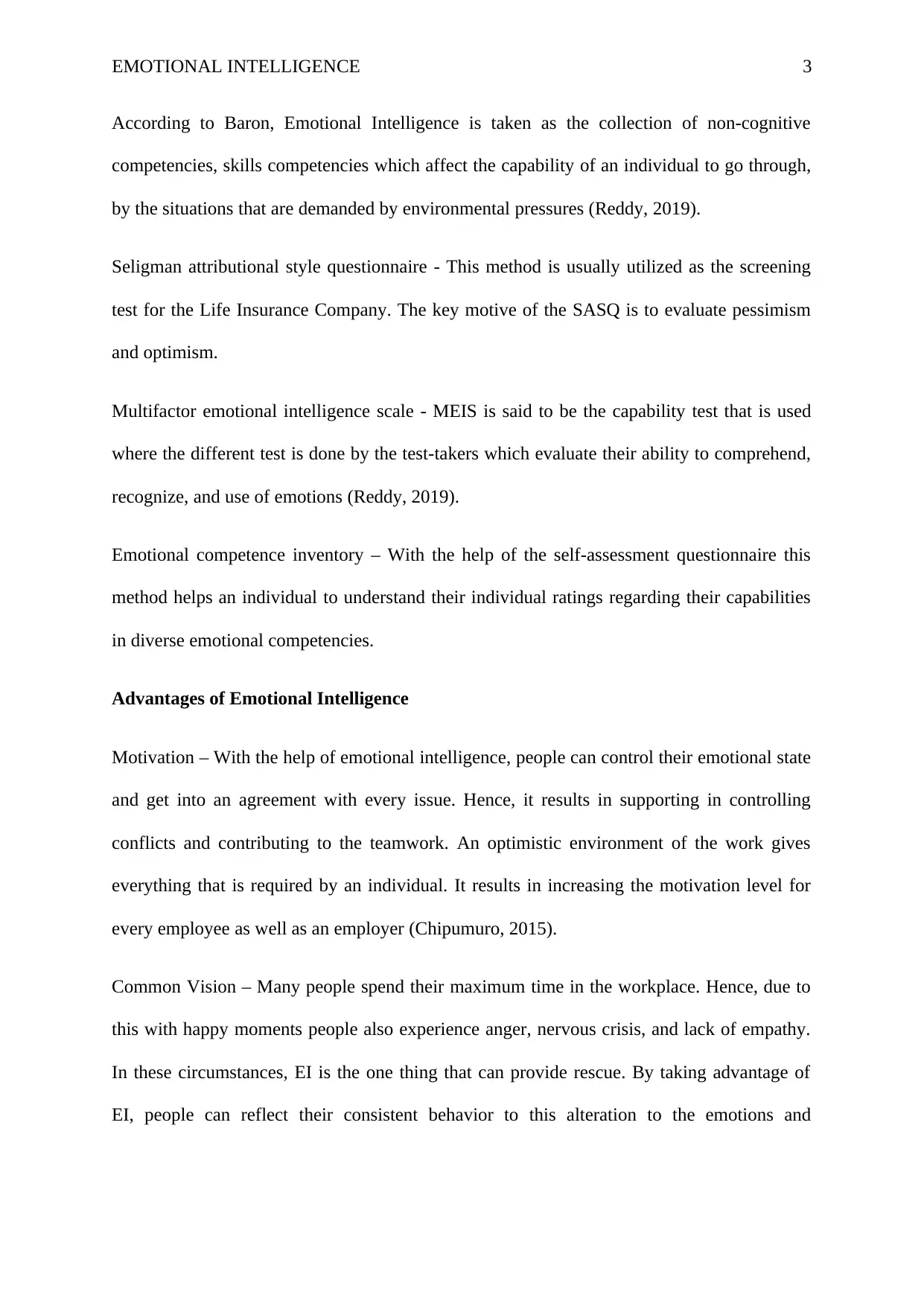
EMOTIONAL INTELLIGENCE 3
According to Baron, Emotional Intelligence is taken as the collection of non-cognitive
competencies, skills competencies which affect the capability of an individual to go through,
by the situations that are demanded by environmental pressures (Reddy, 2019).
Seligman attributional style questionnaire - This method is usually utilized as the screening
test for the Life Insurance Company. The key motive of the SASQ is to evaluate pessimism
and optimism.
Multifactor emotional intelligence scale - MEIS is said to be the capability test that is used
where the different test is done by the test-takers which evaluate their ability to comprehend,
recognize, and use of emotions (Reddy, 2019).
Emotional competence inventory – With the help of the self-assessment questionnaire this
method helps an individual to understand their individual ratings regarding their capabilities
in diverse emotional competencies.
Advantages of Emotional Intelligence
Motivation – With the help of emotional intelligence, people can control their emotional state
and get into an agreement with every issue. Hence, it results in supporting in controlling
conflicts and contributing to the teamwork. An optimistic environment of the work gives
everything that is required by an individual. It results in increasing the motivation level for
every employee as well as an employer (Chipumuro, 2015).
Common Vision – Many people spend their maximum time in the workplace. Hence, due to
this with happy moments people also experience anger, nervous crisis, and lack of empathy.
In these circumstances, EI is the one thing that can provide rescue. By taking advantage of
EI, people can reflect their consistent behavior to this alteration to the emotions and
According to Baron, Emotional Intelligence is taken as the collection of non-cognitive
competencies, skills competencies which affect the capability of an individual to go through,
by the situations that are demanded by environmental pressures (Reddy, 2019).
Seligman attributional style questionnaire - This method is usually utilized as the screening
test for the Life Insurance Company. The key motive of the SASQ is to evaluate pessimism
and optimism.
Multifactor emotional intelligence scale - MEIS is said to be the capability test that is used
where the different test is done by the test-takers which evaluate their ability to comprehend,
recognize, and use of emotions (Reddy, 2019).
Emotional competence inventory – With the help of the self-assessment questionnaire this
method helps an individual to understand their individual ratings regarding their capabilities
in diverse emotional competencies.
Advantages of Emotional Intelligence
Motivation – With the help of emotional intelligence, people can control their emotional state
and get into an agreement with every issue. Hence, it results in supporting in controlling
conflicts and contributing to the teamwork. An optimistic environment of the work gives
everything that is required by an individual. It results in increasing the motivation level for
every employee as well as an employer (Chipumuro, 2015).
Common Vision – Many people spend their maximum time in the workplace. Hence, due to
this with happy moments people also experience anger, nervous crisis, and lack of empathy.
In these circumstances, EI is the one thing that can provide rescue. By taking advantage of
EI, people can reflect their consistent behavior to this alteration to the emotions and
⊘ This is a preview!⊘
Do you want full access?
Subscribe today to unlock all pages.

Trusted by 1+ million students worldwide
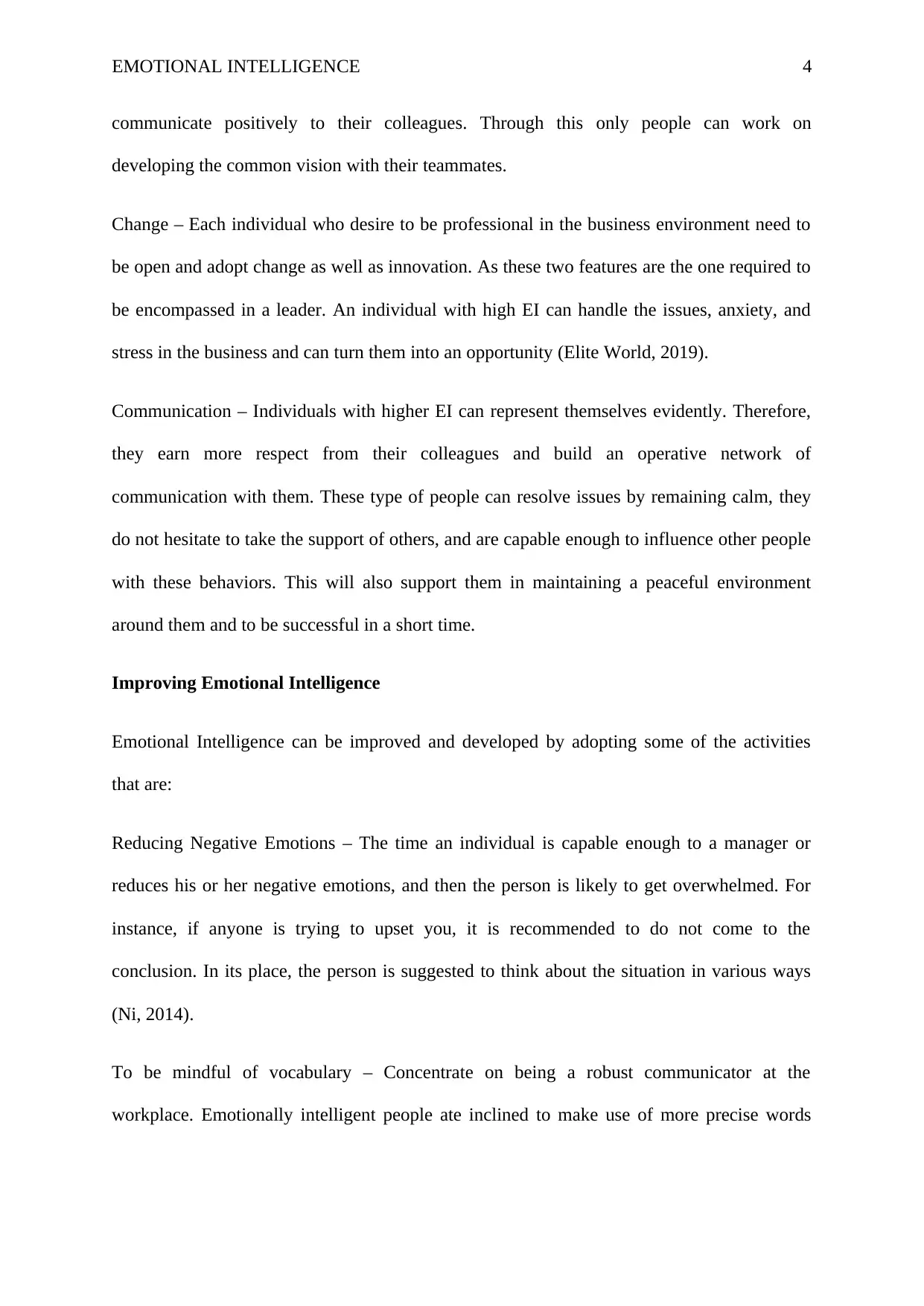
EMOTIONAL INTELLIGENCE 4
communicate positively to their colleagues. Through this only people can work on
developing the common vision with their teammates.
Change – Each individual who desire to be professional in the business environment need to
be open and adopt change as well as innovation. As these two features are the one required to
be encompassed in a leader. An individual with high EI can handle the issues, anxiety, and
stress in the business and can turn them into an opportunity (Elite World, 2019).
Communication – Individuals with higher EI can represent themselves evidently. Therefore,
they earn more respect from their colleagues and build an operative network of
communication with them. These type of people can resolve issues by remaining calm, they
do not hesitate to take the support of others, and are capable enough to influence other people
with these behaviors. This will also support them in maintaining a peaceful environment
around them and to be successful in a short time.
Improving Emotional Intelligence
Emotional Intelligence can be improved and developed by adopting some of the activities
that are:
Reducing Negative Emotions – The time an individual is capable enough to a manager or
reduces his or her negative emotions, and then the person is likely to get overwhelmed. For
instance, if anyone is trying to upset you, it is recommended to do not come to the
conclusion. In its place, the person is suggested to think about the situation in various ways
(Ni, 2014).
To be mindful of vocabulary – Concentrate on being a robust communicator at the
workplace. Emotionally intelligent people ate inclined to make use of more precise words
communicate positively to their colleagues. Through this only people can work on
developing the common vision with their teammates.
Change – Each individual who desire to be professional in the business environment need to
be open and adopt change as well as innovation. As these two features are the one required to
be encompassed in a leader. An individual with high EI can handle the issues, anxiety, and
stress in the business and can turn them into an opportunity (Elite World, 2019).
Communication – Individuals with higher EI can represent themselves evidently. Therefore,
they earn more respect from their colleagues and build an operative network of
communication with them. These type of people can resolve issues by remaining calm, they
do not hesitate to take the support of others, and are capable enough to influence other people
with these behaviors. This will also support them in maintaining a peaceful environment
around them and to be successful in a short time.
Improving Emotional Intelligence
Emotional Intelligence can be improved and developed by adopting some of the activities
that are:
Reducing Negative Emotions – The time an individual is capable enough to a manager or
reduces his or her negative emotions, and then the person is likely to get overwhelmed. For
instance, if anyone is trying to upset you, it is recommended to do not come to the
conclusion. In its place, the person is suggested to think about the situation in various ways
(Ni, 2014).
To be mindful of vocabulary – Concentrate on being a robust communicator at the
workplace. Emotionally intelligent people ate inclined to make use of more precise words
Paraphrase This Document
Need a fresh take? Get an instant paraphrase of this document with our AI Paraphraser
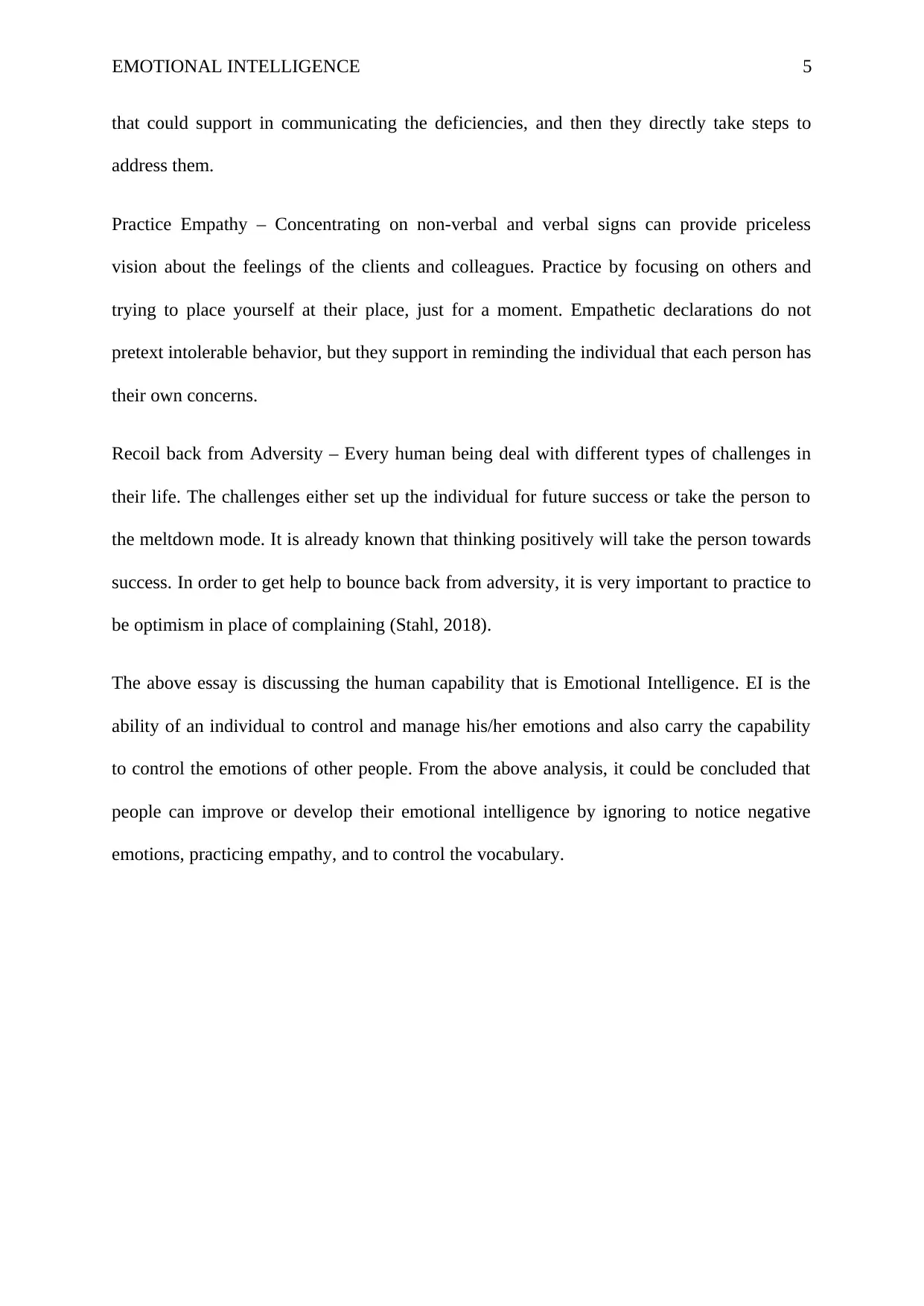
EMOTIONAL INTELLIGENCE 5
that could support in communicating the deficiencies, and then they directly take steps to
address them.
Practice Empathy – Concentrating on non-verbal and verbal signs can provide priceless
vision about the feelings of the clients and colleagues. Practice by focusing on others and
trying to place yourself at their place, just for a moment. Empathetic declarations do not
pretext intolerable behavior, but they support in reminding the individual that each person has
their own concerns.
Recoil back from Adversity – Every human being deal with different types of challenges in
their life. The challenges either set up the individual for future success or take the person to
the meltdown mode. It is already known that thinking positively will take the person towards
success. In order to get help to bounce back from adversity, it is very important to practice to
be optimism in place of complaining (Stahl, 2018).
The above essay is discussing the human capability that is Emotional Intelligence. EI is the
ability of an individual to control and manage his/her emotions and also carry the capability
to control the emotions of other people. From the above analysis, it could be concluded that
people can improve or develop their emotional intelligence by ignoring to notice negative
emotions, practicing empathy, and to control the vocabulary.
that could support in communicating the deficiencies, and then they directly take steps to
address them.
Practice Empathy – Concentrating on non-verbal and verbal signs can provide priceless
vision about the feelings of the clients and colleagues. Practice by focusing on others and
trying to place yourself at their place, just for a moment. Empathetic declarations do not
pretext intolerable behavior, but they support in reminding the individual that each person has
their own concerns.
Recoil back from Adversity – Every human being deal with different types of challenges in
their life. The challenges either set up the individual for future success or take the person to
the meltdown mode. It is already known that thinking positively will take the person towards
success. In order to get help to bounce back from adversity, it is very important to practice to
be optimism in place of complaining (Stahl, 2018).
The above essay is discussing the human capability that is Emotional Intelligence. EI is the
ability of an individual to control and manage his/her emotions and also carry the capability
to control the emotions of other people. From the above analysis, it could be concluded that
people can improve or develop their emotional intelligence by ignoring to notice negative
emotions, practicing empathy, and to control the vocabulary.
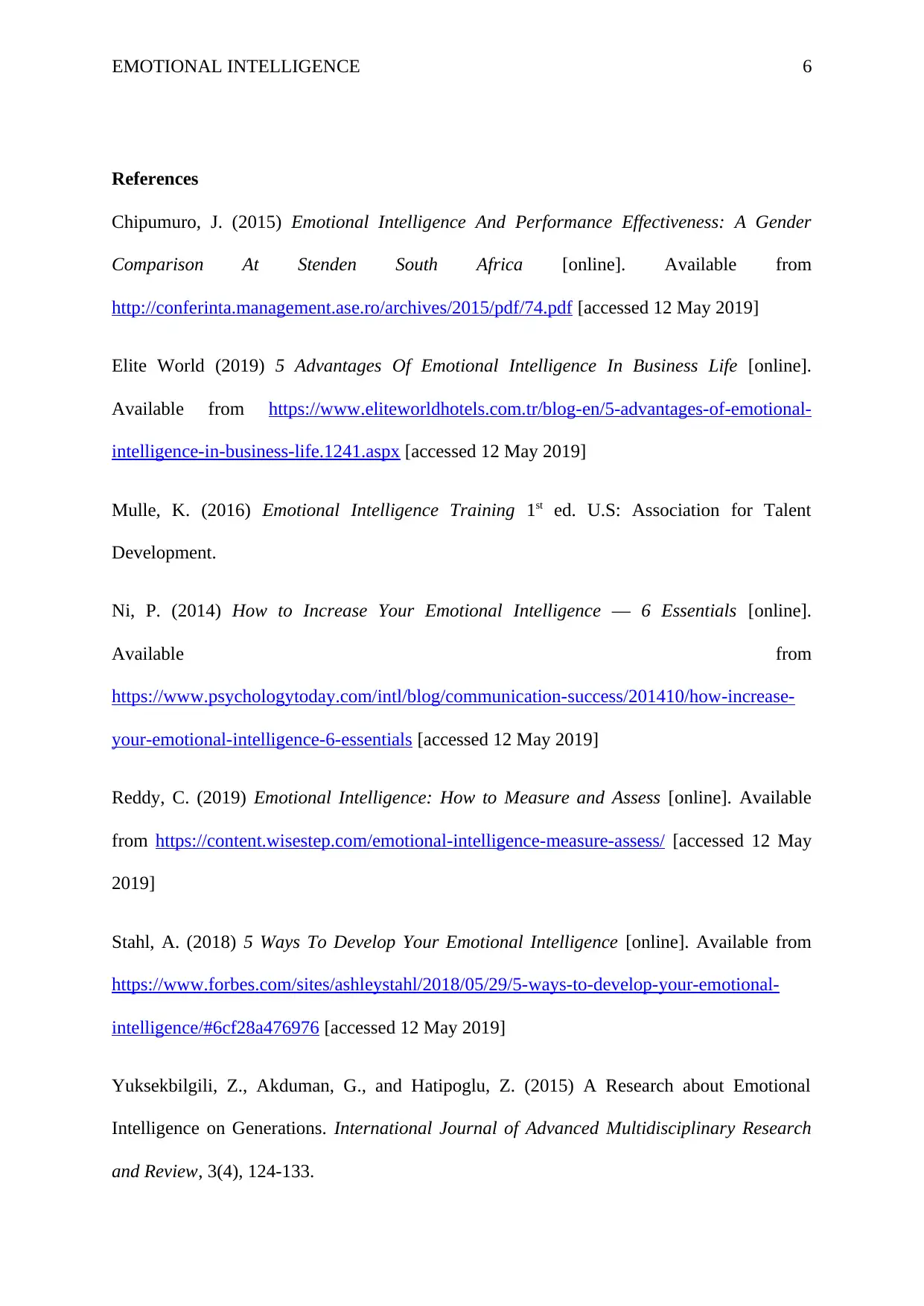
EMOTIONAL INTELLIGENCE 6
References
Chipumuro, J. (2015) Emotional Intelligence And Performance Effectiveness: A Gender
Comparison At Stenden South Africa [online]. Available from
http://conferinta.management.ase.ro/archives/2015/pdf/74.pdf [accessed 12 May 2019]
Elite World (2019) 5 Advantages Of Emotional Intelligence In Business Life [online].
Available from https://www.eliteworldhotels.com.tr/blog-en/5-advantages-of-emotional-
intelligence-in-business-life.1241.aspx [accessed 12 May 2019]
Mulle, K. (2016) Emotional Intelligence Training 1st ed. U.S: Association for Talent
Development.
Ni, P. (2014) How to Increase Your Emotional Intelligence ― 6 Essentials [online].
Available from
https://www.psychologytoday.com/intl/blog/communication-success/201410/how-increase-
your-emotional-intelligence-6-essentials [accessed 12 May 2019]
Reddy, C. (2019) Emotional Intelligence: How to Measure and Assess [online]. Available
from https://content.wisestep.com/emotional-intelligence-measure-assess/ [accessed 12 May
2019]
Stahl, A. (2018) 5 Ways To Develop Your Emotional Intelligence [online]. Available from
https://www.forbes.com/sites/ashleystahl/2018/05/29/5-ways-to-develop-your-emotional-
intelligence/#6cf28a476976 [accessed 12 May 2019]
Yuksekbilgili, Z., Akduman, G., and Hatipoglu, Z. (2015) A Research about Emotional
Intelligence on Generations. International Journal of Advanced Multidisciplinary Research
and Review, 3(4), 124-133.
References
Chipumuro, J. (2015) Emotional Intelligence And Performance Effectiveness: A Gender
Comparison At Stenden South Africa [online]. Available from
http://conferinta.management.ase.ro/archives/2015/pdf/74.pdf [accessed 12 May 2019]
Elite World (2019) 5 Advantages Of Emotional Intelligence In Business Life [online].
Available from https://www.eliteworldhotels.com.tr/blog-en/5-advantages-of-emotional-
intelligence-in-business-life.1241.aspx [accessed 12 May 2019]
Mulle, K. (2016) Emotional Intelligence Training 1st ed. U.S: Association for Talent
Development.
Ni, P. (2014) How to Increase Your Emotional Intelligence ― 6 Essentials [online].
Available from
https://www.psychologytoday.com/intl/blog/communication-success/201410/how-increase-
your-emotional-intelligence-6-essentials [accessed 12 May 2019]
Reddy, C. (2019) Emotional Intelligence: How to Measure and Assess [online]. Available
from https://content.wisestep.com/emotional-intelligence-measure-assess/ [accessed 12 May
2019]
Stahl, A. (2018) 5 Ways To Develop Your Emotional Intelligence [online]. Available from
https://www.forbes.com/sites/ashleystahl/2018/05/29/5-ways-to-develop-your-emotional-
intelligence/#6cf28a476976 [accessed 12 May 2019]
Yuksekbilgili, Z., Akduman, G., and Hatipoglu, Z. (2015) A Research about Emotional
Intelligence on Generations. International Journal of Advanced Multidisciplinary Research
and Review, 3(4), 124-133.
⊘ This is a preview!⊘
Do you want full access?
Subscribe today to unlock all pages.

Trusted by 1+ million students worldwide

EMOTIONAL INTELLIGENCE 7
1 out of 7
Related Documents
Your All-in-One AI-Powered Toolkit for Academic Success.
+13062052269
info@desklib.com
Available 24*7 on WhatsApp / Email
![[object Object]](/_next/static/media/star-bottom.7253800d.svg)
Unlock your academic potential
Copyright © 2020–2025 A2Z Services. All Rights Reserved. Developed and managed by ZUCOL.




